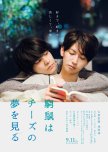This review may contain spoilers
Melancholy
I have really conflicting feelings about this movie (which arrived in a cinema in my home city, so I watched it on the big screen.)
-- It is very well made indeed -- intentionally dark and melancholy, and very successful at that.
-- The actors did excellent work at portraying the deeply flawed characters and their mixture of gravitational attraction and repulsion.
-- I didn't like the inconclusive ending. Some people like being able to "write their own ending," but I don't. After the fact, reading reviews and comments on this site, I learn that the original manga actually had a happier ending. I think I would have preferred that.
-- The sex scenes were quite explicit, without actually showing the family jewels. I was surprised by that, but it didn't bother me. I do think that the nature of the sex scenes (who was doing what to whom) really conveyed important symbolism about the relationship of the two leads.
As to the characters: in some movies or series, my heart just embraces the characters from the beginning, and I want nothing but the best for them. Even if they are flawed. (like Gao Shi De, in We Best Love). But not these characters -- they are just too flawed, and frankly, unable to draw logical conclusions about themselves. I watch them; I never feel for them.
The moments when my heart rejected the characters were:
a) When Otomo, having left behind the wreckage of several different relationships with women, and having made enough of a commitment to his gay lover that they were living together, decides to pursue another woman to the point of getting engaged to marry her. What kind of idiot would DO that -- I understand people who find truths about themselves after marriage and try to maintain loveless marriages and have affairs on the side, but his marriage had ended and he was a free actor. Actively chasing yet another innocent woman when all his signals had been flashing consistently red for some years? How unfair to her and how untrue to himself!
b) When Imagase, who was so head-over-heels in love that he pursued Otomo for years, finally achieves his heart's desire, and then decides to leave, and throw it all away. It doesn't help that Imagase (despite being a fairly sympathetic character) turns out to be a controlling b**** who trolls through his lover's phone, looking for evidence of affairs.
So the fact that these two ended up not together didn't move me much at all. Ho hum....on to the next pair of drama queens.
I also didn't like at all one of the central philosophical constructs of the film: that there is a "straight world" and a "gay world" and people have to choose which type of person they are and which world they will live in. People are not either/or -- they occupy points on an infinitely-detailed spectrum. Clearly, the film seemed to make a bit of an attempt to convey that the "gay world" trope is a dysfunctional imposition by an overly-rigid society, but then in the end the lead characters seem to buy into it, not challenge it. Bleagh.
Interestingly, the audience in the cinema seemed to be largely female (BL fans, I guess) and I am male. So that fan base may not share some of my reactions to the characters, which are no doubt influenced by the fact that in some ways I have actually lived the "different worlds" trope. But that's why I feel so strongly that it needs to be rejected.
-- It is very well made indeed -- intentionally dark and melancholy, and very successful at that.
-- The actors did excellent work at portraying the deeply flawed characters and their mixture of gravitational attraction and repulsion.
-- I didn't like the inconclusive ending. Some people like being able to "write their own ending," but I don't. After the fact, reading reviews and comments on this site, I learn that the original manga actually had a happier ending. I think I would have preferred that.
-- The sex scenes were quite explicit, without actually showing the family jewels. I was surprised by that, but it didn't bother me. I do think that the nature of the sex scenes (who was doing what to whom) really conveyed important symbolism about the relationship of the two leads.
As to the characters: in some movies or series, my heart just embraces the characters from the beginning, and I want nothing but the best for them. Even if they are flawed. (like Gao Shi De, in We Best Love). But not these characters -- they are just too flawed, and frankly, unable to draw logical conclusions about themselves. I watch them; I never feel for them.
The moments when my heart rejected the characters were:
a) When Otomo, having left behind the wreckage of several different relationships with women, and having made enough of a commitment to his gay lover that they were living together, decides to pursue another woman to the point of getting engaged to marry her. What kind of idiot would DO that -- I understand people who find truths about themselves after marriage and try to maintain loveless marriages and have affairs on the side, but his marriage had ended and he was a free actor. Actively chasing yet another innocent woman when all his signals had been flashing consistently red for some years? How unfair to her and how untrue to himself!
b) When Imagase, who was so head-over-heels in love that he pursued Otomo for years, finally achieves his heart's desire, and then decides to leave, and throw it all away. It doesn't help that Imagase (despite being a fairly sympathetic character) turns out to be a controlling b**** who trolls through his lover's phone, looking for evidence of affairs.
So the fact that these two ended up not together didn't move me much at all. Ho hum....on to the next pair of drama queens.
I also didn't like at all one of the central philosophical constructs of the film: that there is a "straight world" and a "gay world" and people have to choose which type of person they are and which world they will live in. People are not either/or -- they occupy points on an infinitely-detailed spectrum. Clearly, the film seemed to make a bit of an attempt to convey that the "gay world" trope is a dysfunctional imposition by an overly-rigid society, but then in the end the lead characters seem to buy into it, not challenge it. Bleagh.
Interestingly, the audience in the cinema seemed to be largely female (BL fans, I guess) and I am male. So that fan base may not share some of my reactions to the characters, which are no doubt influenced by the fact that in some ways I have actually lived the "different worlds" trope. But that's why I feel so strongly that it needs to be rejected.
Was this review helpful to you?

















